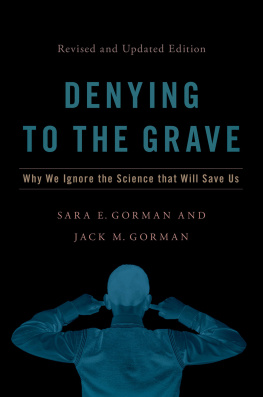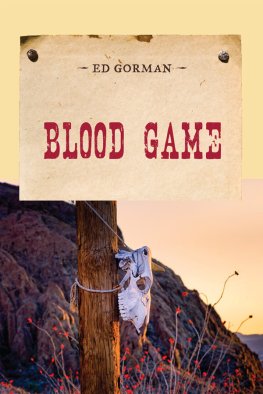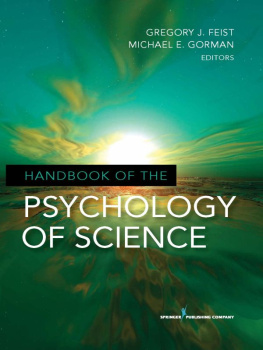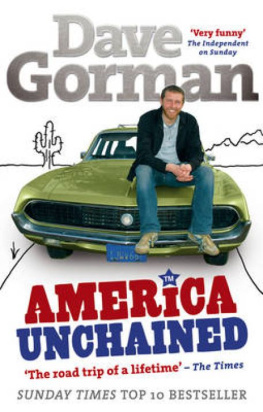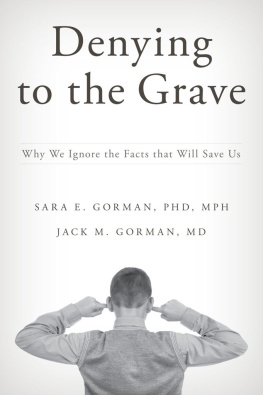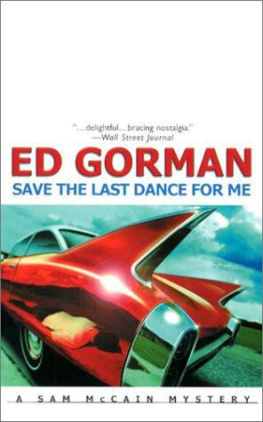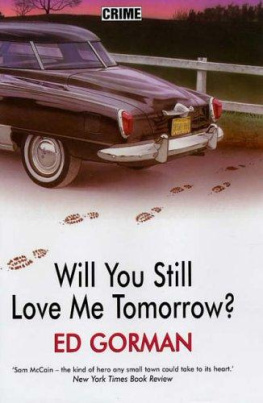Jack M. Gorman - Denying to the grave : why we ignore the science that will save us
Here you can read online Jack M. Gorman - Denying to the grave : why we ignore the science that will save us full text of the book (entire story) in english for free. Download pdf and epub, get meaning, cover and reviews about this ebook. year: 2021, genre: Politics. Description of the work, (preface) as well as reviews are available. Best literature library LitArk.com created for fans of good reading and offers a wide selection of genres:
Romance novel
Science fiction
Adventure
Detective
Science
History
Home and family
Prose
Art
Politics
Computer
Non-fiction
Religion
Business
Children
Humor
Choose a favorite category and find really read worthwhile books. Enjoy immersion in the world of imagination, feel the emotions of the characters or learn something new for yourself, make an fascinating discovery.
- Book:Denying to the grave : why we ignore the science that will save us
- Author:
- Genre:
- Year:2021
- Rating:3 / 5
- Favourites:Add to favourites
- Your mark:
- 60
- 1
- 2
- 3
- 4
- 5
Denying to the grave : why we ignore the science that will save us: summary, description and annotation
We offer to read an annotation, description, summary or preface (depends on what the author of the book "Denying to the grave : why we ignore the science that will save us" wrote himself). If you haven't found the necessary information about the book — write in the comments, we will try to find it.
Jack M. Gorman: author's other books
Who wrote Denying to the grave : why we ignore the science that will save us? Find out the surname, the name of the author of the book and a list of all author's works by series.
Denying to the grave : why we ignore the science that will save us — read online for free the complete book (whole text) full work
Below is the text of the book, divided by pages. System saving the place of the last page read, allows you to conveniently read the book "Denying to the grave : why we ignore the science that will save us" online for free, without having to search again every time where you left off. Put a bookmark, and you can go to the page where you finished reading at any time.
Font size:
Interval:
Bookmark:


Oxford University Press is a department of the University of Oxford. It furthers the Universitys objective of excellence in research, scholarship, and education by publishing worldwide. Oxford is a registered trade mark of Oxford University Press in the UK and certain other countries.
Published in the United States of America by Oxford University Press
198 Madison Avenue, New York, NY 10016, United States of America.
Oxford University Press 2021
All rights reserved. No part of this publication may be reproduced, stored in a retrieval system, or transmitted, in any form or by any means, without the prior permission in writing of Oxford University Press, or as expressly permitted by law, by license, or under terms agreed with the appropriate reproduction rights organization. Inquiries concerning reproduction outside the scope of the above should be sent to the Rights Department, Oxford University Press, at the address above.
You must not circulate this work in any other form and you must impose this same condition on any acquirer.
Library of Congress Cataloging-in-Publication Data
Names: Gorman, Sara E., editor. | Gorman, Jack M., editor.
Title: Denying to the grave : why we ignore the science that will save us /
Sara E. Gorman and Jack M. Gorman, [editors].
Description: Revised and updated edition. |
New York, NY : Oxford University Press, [2021] |
Previous edition entered under: Sara E. Gorman. |
Includes bibliographical references and index. |
Identifiers: LCCN 2020054636 (print) | LCCN 2020054637 (ebook) |
ISBN 9780197547458 (hardback) | ISBN 9780197547472 (epub) |
ISBN 9780197547489 (Digital-Online)
Subjects: LCSH: Social medicine. | ScienceMethodology. | Skepticism. |
Belief and doubt (Psychology) | Denial (Psychology)
Classification: LCC RA418 .G64 2021 (print) | LCC RA418 (ebook) |
DDC 362.1dc23
LC record available at https://lccn.loc.gov/2020054636
LC ebook record available at https://lccn.loc.gov/2020054637
DOI: 10.1093/oso/9780197547458.001.0001
In memory of Howard Kantor, tireless devotee of science and medicine, beloved father, grandfather, and husband and of Kate Gorman, beloved mother, grandmother, and great grandmother.
The information in this book is not intended to replace the advice of the readers own physician or other medical professional. You should consult a medical professional in matters relating to your health, especially if you have existing medical conditions, and before starting, stopping, or changing the dose of any medication you are taking. Individual readers are solely responsible for their own healthcare decisions. The authors and the publisher do not accept responsibility for any adverse effects individuals may claim to experience, whether directly or indirectly, from the information contained in this book.
We would like to express our gratitude to all the wonderful, inspiring people who helped us write this book. First and foremost, we thank all of the brilliant scholars and medical and public health practitioners, without whose contributions to our growing body of knowledge about neuroscience, psychology, and health decision-making this book would have been impossible to write. Wed like to thank in particular the following scholars, who all generously served as interlocutors at some stage during the writing of this book: Daniel Kahneman, Michael Shermer, Seth Mnookin, Tal Gross, Kate Starbird, Kathleen Hall Jamieson, Howard Neukrug, Yochai Benkler, and Nicoli Nattrass. We are very grateful to the anonymous reviewers of the book whose input was critical in shaping and improving our final product. We are indebted to the wonderful people at Oxford University Press, including our fantastic editor, Sarah Harrington, whose sharp insight was always much appreciated.
Sara would also like to thank her colleagues and mentors at work for allowing her the time and flexibility to work on the book and for supporting and encouraging her along the way.
Many people provided intellectual and emotional support to Jack that was indispensable in writing this book, and he is especially grateful to Colin Leinster, Richard Munich, Catherine DiDesidero, Amy Monahan, Dionne Monsanto, Fletcher Harper, Bruce Brady, Rabbi Avi Weiss, Rabbi Steven Exler, Alexandra Roth-Kahn, Stan Arkow, Cindy Aaronson, Marc and Harriet Suvall, Gary and Jamie Gordon, Ben and Barbara Zucker, Joel Einlinger, Miriam Westheimer, Carol Clayton, Leigh Steiner, and David Bressman for their creative ideas and friendship.
We would like to thank our wonderful Critica team, starting with David Scales, a great physician, scholar, moral compass, and friend and including Cody Leff, Catherine DiDesidero, Cindy Goldstein, and Peter DiCaprio.
Finally, there are many amazing people in our personal lives who have offered us critical support as we undertook this journey. Because we are father and daughter, we have most of them in common. We are deeply grateful to Rachel Moster, Saras sister and Jacks daughter, and David Moster, Rachels husband, for being our all-time champions, for always being there for us, and for always sharing our excitement with their overwhelming warmth, intellectual prowess, and zest.
We wrote this book with the people of the future in mind, who face the consequences of the climate crisis and all the other mistakes our generations make. They need all of us to embrace the scientific realities of what we are doing and should be doing immediately. In particular, we think with love of Jacks three grandchildren, Hannah Beth Moster, Jonah Moster, and Raphael Kohen, who is also Saras son.
Two people are the bedrock and inspiration for all we do. Lauren Kantor Gorman, Saras mother and Jacks wife, is the beacon of light in the madness that sometimes comes from writing a book. As a brilliant psychiatrist, she has wonderful insights into the emotional basis for peoples choices and decisions that helped us enormously in focusing our own ideas. We thank her for always being so steady, reliable, and smart, and for showering us with her constant love and warmth. Last but by no means least, wed like to thank Robert Kohen, Saras husband and Jacks son-in-law. Robert is our brilliant interlocutor, our intellectual companion, and our unending inspiration. Thank you for being you.
It turns out that Thomas Duncan was not the only person who died in the United States on October 8, 2014. If we extrapolate from national annual figures, we can say that on that day almost 7,000 people died in the United States. About half of them died of either heart disease or cancer; 331 from accidents, of which automobile accidents are the most common; and 105 by suicide. The chance of being killed in a car crash is about 1,500 times greater than the risk of getting infected with the Ebola virus in the United States.
It probably comes as no surprise that there were very few front-page headlines about bee stings or shark attacks on October 8, 2014, let alone about car crashes and gun violence. Perhaps this seems natural. After all, Ebola virus infection, the cause of Ebola hemorrhagic fever, is unusual in the United States, whereas heart attacks, cancer, car crashes, suicide, and murder happen on a regular basis. The problem, however, with the media emphasizing (and ordinary people fearing) Ebola over other far more prevalent health threats is that it shapes our behavior, sometimes in dangerous ways. How many people smoked a cigarette or consumed a sugary breakfast cereal while reading about the threat they faced in catching Ebola?
Font size:
Interval:
Bookmark:
Similar books «Denying to the grave : why we ignore the science that will save us»
Look at similar books to Denying to the grave : why we ignore the science that will save us. We have selected literature similar in name and meaning in the hope of providing readers with more options to find new, interesting, not yet read works.
Discussion, reviews of the book Denying to the grave : why we ignore the science that will save us and just readers' own opinions. Leave your comments, write what you think about the work, its meaning or the main characters. Specify what exactly you liked and what you didn't like, and why you think so.

